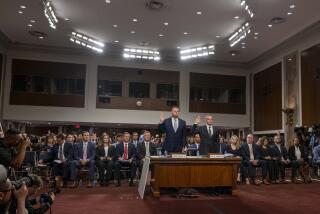FBI Official Defends Controversial Ruby Ridge Review : Probe: Charles Mathews tells Senate panel that sniper’s shots were in line with standards for use of deadly force. Lawmakers express skepticism.
- Share via
WASHINGTON — Facing skeptical senators, an FBI official Wednesday defended his review of the 1992 Ruby Ridge, Ida., siege--the report relied on by Director Louis J. Freeh when he spared several bureau officials from severe punishment.
Charles Mathews, assigned by FBI headquarters to review a Justice Department report on the incident in which three people were killed, said evidence shows that two shots fired by an FBI sniper--one of which killed a woman--were in line with the bureau’s standards dealing with the use of deadly force and not the result of illegal shooting rules drawn up at the remote, mountainous Idaho site.
Speaking of FBI sniper Lon Horiuchi, Mathews said: “He only discharged his weapon to save lives.”
Horiuchi--whose shots killed Vicki Weaver and wounded her husband, Randy Weaver, and his friend, Kevin Harris--invoked his 5th Amendment protection against self-incrimination last week in refusing to testify before the Senate Judiciary subcommittee on terrorism, now in its third week of hearings on the siege.
In addition to Vicki Weaver, the events at Ruby Ridge resulted in the deaths of her 14-year-old son, Sammy, and William Degan, a deputy U.S. marshal.
Citing testimony that Horiuchi’s second shot was fired at Harris as he fled for the shelter of the Weaver cabin, Sen. Arlen Specter (R-Pa.), the subcommittee chairman, asked: “Is it aggressive behavior to flee, to retreat?”
Mathews said the facts “clearly demonstrated” that the danger continued. Earlier witnesses had said one of the armed men fired on by Horiuchi had raised his weapon in the direction of a helicopter carrying FBI personnel. Mathews said the man appeared to be “running for a better [firing] position.” He also noted: “The subject had not thrown his weapon down and said: ‘I surrender.’ ”
“I have to disagree with you completely,” Specter said. “That’s hardly aggressive behavior.”
The distinction is important because the standard “deadly force” rules permit an agent to fire to protect himself or others from death or grievous bodily harm, while under the specially drawn rules at Ruby Ridge agents “could and should” shoot any armed male outside the cabin.
Specter noted that the Supreme Court has held that an “immediate threat” must be presented to justify law enforcement using deadly force.
Mathews defended the decision, made during his investigation, not to question Eugene F. Glenn, the FBI’s on-scene commander at Ruby Ridge, about who had authorized the controversial shooting rules, known as the rules of engagement.
Glenn, one of those most severely disciplined for his role at Ruby Ridge, testified Monday that he had been made a scapegoat in an effort to satisfy “hungry sharks.” Mathews cited Glenn’s earlier sworn statements, given to both the FBI shooting review team and to investigators with a Justice Department task force and said: “I was aware of Glenn’s position.”
Despite Glenn’s testimony that he had discussed the permissive shooting rules with then-Assistant FBI Director Larry Potts, Mathews said that he found the “preponderance of evidence” supports the conclusion that those were not the same rules adopted at Ruby Ridge.
Mathews said he had not recommended censure for Potts and his then-deputy Danny Coulson, who were overseeing the Ruby Ridge situation from the FBI’s command center here. He said Freeh had decided on that punishment. Freeh subsequently promoted Potts to the FBI’s No. 2 position but later removed and suspended him, along with Coulson and three other FBI officials, who now are under investigation to determine whether they lied about Ruby Ridge.
In other testimony Wednesday, James (Bo) Gritz, a former Green Beret colonel, said he had been told by FBI hostage rescue team commander Richard Rogers that the FBI had targeted Vicki Weaver because she “would kill her children rather than ever allow them to surrender.”
Gritz said the FBI team was too schooled in military solutions to be used without stronger supervision. “These are not Efrem Zimbalist Jrs.,” he said. “These are commandos.”
Gritz helped negotiate the surrender of Weaver, who was being sought on gun charges, 10 days after his wife was killed. Gritz insisted that there was “no indication . . . that the shooting of Mrs. Weaver was an accident,” as the FBI maintains.
More to Read
Sign up for Essential California
The most important California stories and recommendations in your inbox every morning.
You may occasionally receive promotional content from the Los Angeles Times.













